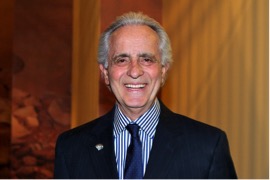Productions
Dramaturgical Resources
2016
When You Comin Back, Red Ryder?
By Mark Medoff
Over the course of the season, our assistant directors and student dramaturgs will be compiling dramaturgical resources relating to each production as it develops. Below are some links to websites which relate to the history of the play, the biography of the playwright, and sites that contextualize and, we hope, shed light on the directorial approach to the dramatic material.
We hope you find these resources of interest.

Mark Medoff (b. 1940)
The Playwright
Mark Medoff, born in 1940 in Mount Carmel, Illinois, is an esteemed playwright, director, and screenwriter.
After receiving his Bachelor of Arts from the University of Miami and his Master’s from Stanford University, Medoff began his theatrical career by acting in various stage productions. During these excursions, Medoff soon realized his true callings lay in the writing and directing, beginning in 1967 with his first play, The Wager. 1973 saw Medoff’s first production staged in New York City, When You Comin’ Back, Red Ryder?, which went on to receive an Obie award the following year.
From here, Medoff’s fame only continued to grow, as did is writing repertoire. 1980 saw the opening of Children of a Lesser God, which went on to receive the Tony Award for Best Play the following year. Shortly thereafter, Medoff adapted the script into a screenplay, and in 1986, the film version of Children of a Lesser God was released, eventually garnering five Academy Award nominations.
Mark Medoff’s entire bibliography can be found here.
The Play
When You Comin’ Back, Red Ryder? discusses a number of ideas that first entered the mainstream consciousness around the time of this play’s conception (i.e., late 1960’s/early 1970’s). And while they are presented in a radical fashion, the base concepts are sound.
Wikipedia provides a nice overview of the Red Ryder brand, with additional links at the bottom of the page for further reading.
A succinct summary of the post-World War II era in the United States, from the late 40’s to the late 60’s.
The idea of the obsolescence of the “peace and love” movement is covered in the play; Encyclopedia Britannica gives a quick look at the hippie movement.
For the history-buffs out there, here’s an extremely detailed thesis discussing the variety of impacts the Vietnam War had on American society; if that’s a little too in-depth, a more cursory evaluation of the event should suffice.
To complete the menagerie of ideologies on display, the character Stephen Ryder is desperately trying to emulate the stereotypical 1950’s tough-guy, akin to Marlon Brando in the 1953 film The Wild Ones. Naturally, this is shown to be an outdated mode of thinking in the modern age of the 1970’s.
Finally, while not imperative, it would still benefit an audience member to know of Duke Snider, or Edwin Donald Snider, a famed New York Yankees player of the twentieth century, if only to not look like an ignorant buffoon the next time Todd from accounting is talking about baseball around the water cooler.